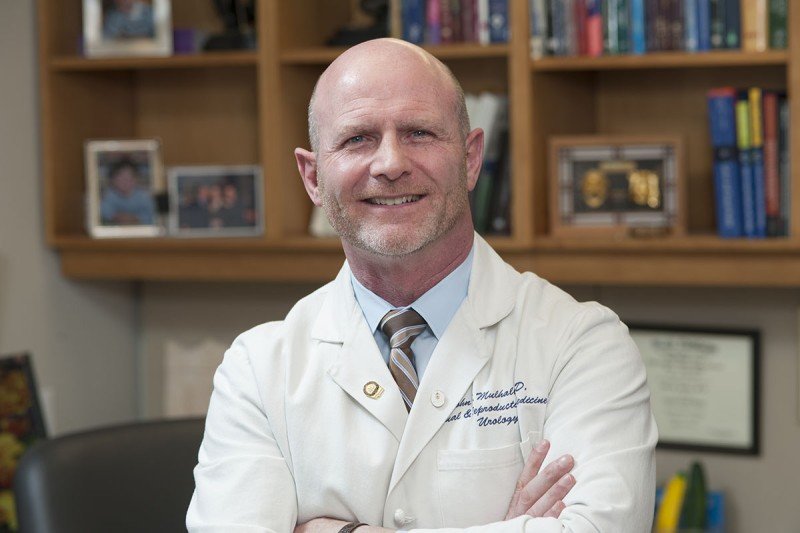
Men’s sexual dysfunction is common during cancer treatment, so why doesn’t anyone talk about it? The medical team treating a cancer too often fails to address the potential impact on the patient’s sex life, despite the fact that it can be essential for emotional well-being. If the problems are not addressed early, they may never be resolved.
Diane Reidy-Lagunes, medical oncologist at Memorial Sloan Kettering Cancer Center and host of Cancer Straight Talk from MSK, a podcast for people with cancer and their loved ones, sat down with urologic surgeon John Mulhall, Director of the Male Sexual and Reproductive Medicine Program at MSK and editor-in-chief of The Journal of Sexual Medicine, to discuss the impacts of cancer and its treatment on men’s sexual health.
Diane Reidy-Lagunes speaks with Dr. John Mulhall, director of Male Sexual and Reproductive Medicine at MSK and editor-in-chief of The Journal of Sexual Medicine, to discuss the impacts of cancer and its treatment on men’s sexual health.
The First Steps
Any cancer or cancer treatment can cause sexual dysfunction, and it can start at the time of diagnosis. “[A cancer diagnosis] is a traumatic, stressful event. And that impacts upon [a patient’s] sex drive,” says Dr. Mulhall. Any long period of time without an erection, regardless of the underlying cause, is “lethal for the health of erectile tissue,” he explains, and must be addressed early in the cancer treatment.
Men need to be given realistic expectations about the effects of their treatment on their sexual health, says Dr. Mulhall, but their doctors too often are not skilled at having these conversations.
He advises that patients go into their consultation knowing what they want to discuss. “If your sex life is important to you, it’s important that you declare that to the physician,” Dr. Mulhall says. “If there is one takeaway from this conversation, it will be that if you are going to have some treatment that may interfere with your ejaculation, you really should give serious consideration to banking sperm.”
The Reality
Dr. Mulhall sees patients daily with a diverse range of dysfunctions, and most have more than one. Diminished libido, weight gain, ejaculatory distress, and erectile dysfunction (ED) are just some of the issues that can impact men’s sex lives. The most frequent complaint is ED.
Surgery can cause damage that leads to ED. “It can damage the nerves that supply the penis,” says Dr. Mulhall. “Those nerves frequently recover, but that can take 18 to 24 months after the operation.” The muscle function must be protected while the nerves recover during this time through rehabilitation, such as by using PDE5 inhibitors, like Viagra®.
Other cancer treatments that can negatively impact men’s sexual health are radiation, which may change the structure of the penis, and hormone therapy — such as androgen deprivation therapy (ADT) — which shuts down testosterone production.
The Options
Dr. Mulhall believes in starting with the least invasive treatment options for sexual problems. He first considers psychological issues that may need to be addressed and works with psychologist Christian Nelson, Chief of MSK’s Psychiatry Service.
Dr. Mulhall says the first line of therapy for ED is PDE5 inhibitors, such as Viagra®, Levitra®, Stendra®, and Cialis®. He says that “70% of men are going to respond.” Adding, “Almost certainly, 90% of men with psychologically based ED who have no other cause will respond to these pills.”
For those who do not respond to PDE5 inhibitors, penile injection therapy can be used, and is a major part of MSK’s rehabilitation program in radical pelvic surgery patients. “It is a highly effective, very safe form of treatment,” Dr. Mulhall says. Many are stressed by the concept of a penile injection, but Dr. Mulhall explains, “It’s a diabetic needle injected to the middle of the shaft of the penis — [like a] mosquito bite.”
For patients who unfortunately may not fully recover their sexual function, Dr. Mulhall says they often can have fulfilling sex lives in other ways. “We can guide them through that process.”
To learn more about how men with cancer can continue to enjoy sexual intimacy, tune in to this episode of Cancer Straight Talk from MSK.



